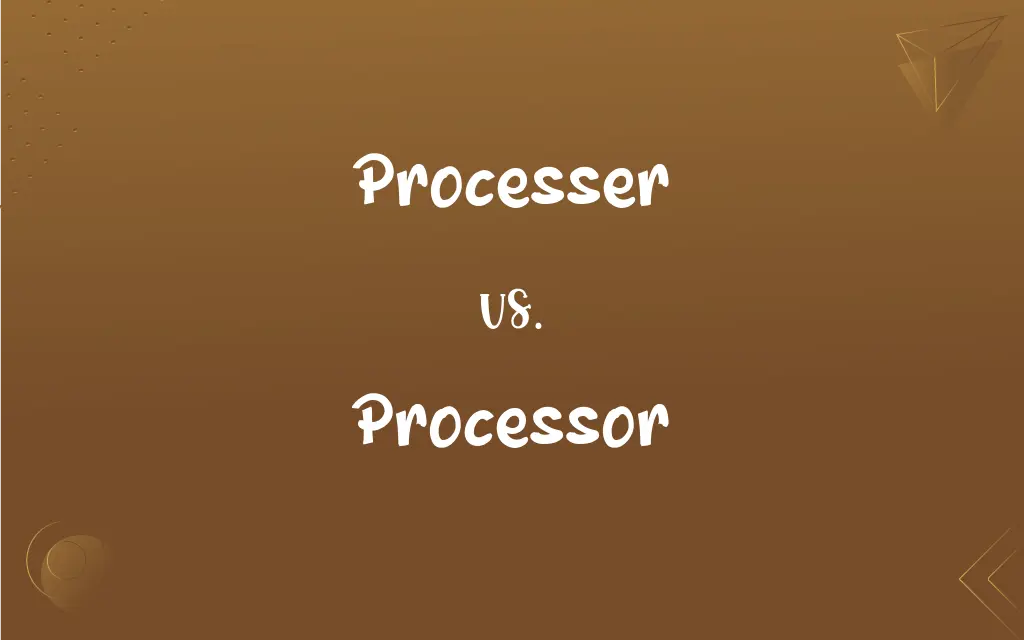Processer vs. Processor: What's the Difference?
By Harlon Moss & Janet White || Updated on March 4, 2024
A processor is the primary component of a computer that performs calculations, whereas a "processer" is often a misspelling or used in specific non-standard contexts.

Key Differences
A processor, also known as a central processing unit (CPU), is the brain of the computer, responsible for executing instructions and processing data. It plays a critical role in the overall performance of a computer system, handling tasks such as computation, control, and data management. On the other hand, "processer" is not a commonly recognized term in computing or technology. It is sometimes mistakenly used instead of "processor" but lacks a standardized definition and application in technical contexts.
Processors come in various types and capabilities, ranging from simple microprocessors for basic computing tasks to powerful multi-core processors designed for high-end computing and multitasking. Whereas "processer" does not refer to a specific type of technology or component within the computing industry, making it difficult to compare directly in terms of performance or specifications.
The development and innovation in processor technology have been pivotal in advancing computing power, efficiency, and miniaturization, leading to the creation of faster and more energy-efficient devices. On the contrary, since "processer" does not denote a specific entity or concept in technology, there is no corresponding development or innovation trajectory associated with it.
Processors are integral to the functionality of a wide array of devices, from computers and smartphones to embedded systems in appliances and vehicles. This ubiquity underscores their importance in modern technology. In contrast, the term "processer" lacks a clear application or relevance in the context of devices or technology, highlighting the distinction in their roles and significance.
Manufacturers and brands are continually improving processor designs, focusing on aspects like speed, energy consumption, and processing capabilities to meet growing computational demands. Meanwhile, the term "processer," lacking a concrete role or definition, is not subject to design improvements or technological advancements, further emphasizing the difference in their contributions to technology and innovation.
ADVERTISEMENT
Comparison Chart
Definition
A chip that executes instructions and processes data in computers and other devices.
Often a misspelling of "processor" or used in non-standard contexts without a specific technical meaning.
Role in Computing
Central to device operation, handling computations, control, and data management.
No defined role or standard application in computing.
Types and Capabilities
Ranges from basic microprocessors to advanced multi-core processors for various computing needs.
Not applicable, as it does not refer to a specific technology or component.
Development and Innovation
Subject to continuous advancements in technology, enhancing computing power and efficiency.
Lacks a trajectory of development or innovation due to the absence of a defined concept or application.
Importance in Technology
Integral to the functionality of a wide range of computing devices and systems.
Lacks clear relevance or applicatio
ADVERTISEMENT
Processer and Processor Definitions
Processer
A processor is the central unit in a computer that performs instructions from programs.
The new laptop has a faster processor for better performance.
Processor
"Processer" is sometimes used incorrectly in place of "processor."
He mistakenly referred to the CPU as the processer.
Processer
Processors are designed to execute a series of instructions efficiently.
Modern processors can handle billions of calculations per second.
Processor
In non-standard contexts, "processer" may refer to someone or something that processes something.
The document processer software automatically formats the text.
Processer
Multi-core processors contain multiple processing units on one chip for multitasking.
My computer's quad-core processor can run several applications smoothly.
Processor
Usage of "processer" can lead to confusion due to its unclear meaning.
Using processer in a technical document confused the readers about its intended meaning.
Processer
The efficiency of a processor is often measured in gigahertz (GHz).
This processor runs at 3.5 GHz, making it quite powerful.
Processor
The term "processer" lacks a standard definition in computing.
The manual contains a typo that says processer instead of processor.
Processer
Processors are manufactured by companies like Intel and AMD.
The latest processors from Intel offer improved energy efficiency.
Processor
One that processes, especially an apparatus for preparing, treating, or converting material
A wood pulp processor.
Processer
Someone who processes
Processor
A computer.
Processor
A central processing unit.
Processor
A program that translates another program or a data file into a form acceptable by the computer being used.
Processor
A person or institution who processes things (foods, photos, applications, etc.).
He is a loan processor with a bank.
Processor
A device which processes, which changes something (a computer processor, food processor, etc.).
The food processor shredded the vegetables.
Processor
A central processing unit.
This mainframe's processor is fast.
Processor
A microprocessor.
This computer has two processors, but only one keyboard.
Processor
A business engaged in processing agricultural products and preparing them for market
Processor
Someone who processes things (foods or photographs or applicants etc.)
Processor
(computer science) the part of a computer (a microprocessor chip) that does most of the data processing; the CPU and the memory form the central part of a computer to which the peripherals are attached
Processor
"Processer" is not commonly recognized in technological terminology.
Searching for processer online mostly results in corrections to processor.
FAQs
Can "processer" and "processor" be used interchangeably?
In proper technical terminology, no. "Processor" is the correct term for the component that performs computations in devices.
What is a processor?
A processor, or CPU, is the primary component in a computer responsible for executing instructions and processing data.
Why is the processor considered the brain of the computer?
Because it performs the essential functions of executing instructions and processing data, enabling the computer to operate.
Who manufactures processors?
Companies like Intel, AMD, and Qualcomm are leading manufacturers of processors.
What does multi-core mean in processors?
Multi-core processors have multiple processing units (cores) on a single chip, allowing for improved multitasking and efficiency.
Are processors only used in computers?
No, processors are used in a variety of devices, including smartphones, tablets, and embedded systems.
What is the role of a processor in a smartphone?
It performs the smartphone's computational tasks, similar to a computer, affecting its speed, efficiency, and multitasking capabilities.
Is "processer" a correct term in computing?
No, "processer" is often a misspelling of "processor" and lacks a standardized definition in computing contexts.
Do all electronic devices have processors?
Most electronic devices, especially those requiring computational tasks, include some form of processor.
How does processor speed affect a computer's performance?
Higher processor speeds can handle more operations per second, leading to faster and more efficient performance.
What improvements do manufacturers focus on for new processors?
They focus on increasing speed, reducing power consumption, and enhancing processing capabilities.
What types of processors are there?
There are various types, including single-core, multi-core, and specialized processors like graphics processing units (GPUs).
How do processors impact gaming performance?
Processors affect game loading times, frame rates, and overall smoothness of gameplay, with higher performance processors offering better gaming experiences.
Why might someone mistakenly use "processer" instead of "processor"?
It may be due to a typo or misunderstanding, as "processer" is not the standard term for the computing component.
Can a device function without a processor?
No, the processor is essential for executing instructions and processing data, making it indispensable for device operation.
What is the significance of GHz in processors?
GHz, or gigahertz, measures the speed at which a processor can execute instructions, indicating its performance level.
Can processors be upgraded in all devices?
It depends on the device. Some, like desktop computers, allow for processor upgrades, while others, like many smartphones, do not.
What is the difference between a processor and a microprocessor?
A microprocessor is a type of processor designed specifically for basic computing tasks, often found in simpler devices.
How do processors contribute to energy efficiency in devices?
Modern processors are designed to maximize performance while minimizing power consumption, contributing to longer battery life and reduced energy costs.
What does overclocking a processor mean?
Overclocking involves increasing a processor's operating speed beyond its official speed rating to enhance performance.
About Author
Written by
Harlon MossHarlon is a seasoned quality moderator and accomplished content writer for Difference Wiki. An alumnus of the prestigious University of California, he earned his degree in Computer Science. Leveraging his academic background, Harlon brings a meticulous and informed perspective to his work, ensuring content accuracy and excellence.
Co-written by
Janet WhiteJanet White has been an esteemed writer and blogger for Difference Wiki. Holding a Master's degree in Science and Medical Journalism from the prestigious Boston University, she has consistently demonstrated her expertise and passion for her field. When she's not immersed in her work, Janet relishes her time exercising, delving into a good book, and cherishing moments with friends and family.































































